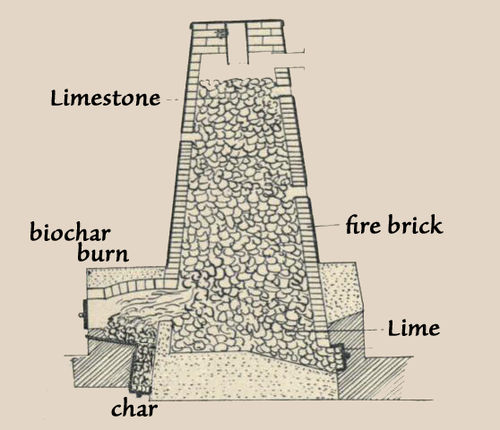Biochar-Lime Co-production System: Difference between revisions
No edit summary |
No edit summary |
||
| Line 3: | Line 3: | ||
Idea to couple the production of [[biochar]] with [[lime]] burning. The pyrolysis gas generated during char production is not flared off but used to make quicklime, which has many uses in construction and other areas. The process is carbon-negative. This type of production needs relatively close ('round the clock) monitoring but there is potential for automation. | Idea to couple the production of [[biochar]] with [[lime]] burning. The pyrolysis gas generated during char production is not flared off but used to make quicklime, which has many uses in construction and other areas. The process is carbon-negative. This type of production needs relatively close ('round the clock) monitoring but there is potential for automation. | ||
The concept depicted on the right is also known as a [https://en.wikipedia.org/wiki/Rumford_furnace Rumford furnace]. Our modification is that the input is uncharred biomass such as wood, and that it is only charred (pyrolyzed), but not completely burned to ash. | The concept depicted on the right is also known as a [https://en.wikipedia.org/wiki/Rumford_furnace Rumford furnace]. Our modification is that the input is uncharred biomass such as wood, and that it is only charred (pyrolyzed), but not completely burned to ash. The system has flexibility though, and if ash instead of char is the desired product (e.g. for [[lye]] production or other purposes, that that can be done as well. | ||
Heat is another co-product that could be used for space heating, greenhouses, etc. | Heat is another co-product that could be used for space heating, greenhouses, steam, etc. | ||
Similar concept to this one: [http://opensourceecology.org/wiki/Biochar/Brick_Co-production_System Biochar/Brick Co-Production System]. | Similar concept to this one: [http://opensourceecology.org/wiki/Biochar/Brick_Co-production_System Biochar/Brick Co-Production System]. | ||
Revision as of 00:22, 2 March 2016

Idea to couple the production of biochar with lime burning. The pyrolysis gas generated during char production is not flared off but used to make quicklime, which has many uses in construction and other areas. The process is carbon-negative. This type of production needs relatively close ('round the clock) monitoring but there is potential for automation.
The concept depicted on the right is also known as a Rumford furnace. Our modification is that the input is uncharred biomass such as wood, and that it is only charred (pyrolyzed), but not completely burned to ash. The system has flexibility though, and if ash instead of char is the desired product (e.g. for lye production or other purposes, that that can be done as well.
Heat is another co-product that could be used for space heating, greenhouses, steam, etc.
Similar concept to this one: Biochar/Brick Co-Production System.